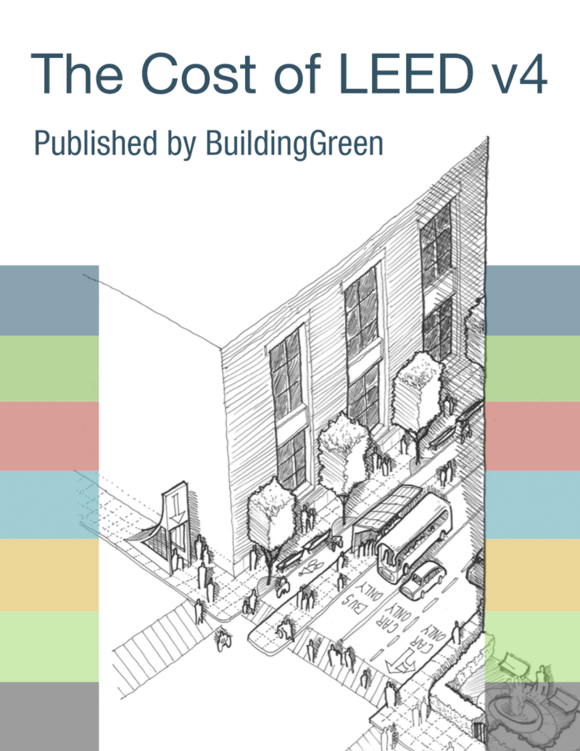LEEDuser’s viewpoint
Frank advice from LEED experts
LEED is changing all the time, and every project is unique. Even seasoned professionals can miss a critical detail and lose a credit or even a prerequisite at the last minute. Our expert advice guides our LEEDuser Premium members and saves you valuable time.
Credit language

© Copyright U.S. Green Building Council, Inc. All rights reserved.
Requirements
Option 1. In-house IPM program
Have in place an integrated pest management (IPM) plan for the building and grounds within the project boundary. The IPM plan must include the following elements.
- Identification of an IPM team. Identify roles for building management, pest management contractors, maintenance staff, and liaisons with building occupants.
- Provisions for identifying and monitoring pests. Specify inspections, pest population monitoring, and a reporting system that allows occupants, maintenance staff, and others to report evidence of pest infestations.
- Action thresholds for all pests likely encountered in the building. Also describe a process for modifying action thresholds, if necessary, through active communication between occupants and the IPM team.
- Nonchemical pest preventive measures, either designed into the structure or implemented as part of pest management activities.
- Pest control methods to be used when action thresholds are exceeded. For each pest, list all potential control methods considered and adopt the lowest-risk options, considering the risks to the applicator, building occupants, and the environment. The plan must preferentially require nonchemical approaches, with pesticides registered for the site applied only if those approaches fail. Give preference to the use of least-risk pesticides based on inherent toxicity and exposure potential. If a pesticide that is not in the least-risk category is selected, document the reason.
- A mechanism for documentation of inspection, monitoring, prevention, and control methods and for evaluation of the effectiveness of the IPM plan. Specify the metrics by which performance will be measured, and describe the quality assurance process to evaluate and verify successful implementation of the plan.
- A strategy for communications between the IPM team and the building occupants (for schools, faculty and staff). This strategy should include education about the IPM plan, participation in problem solving, feedback mechanisms (e.g., a system for recording pest complaints), and provision for notification of pesticide applications. At a minimum, the facility manager must notify any building occupant or employee who requests it and post a sign at the application site, which must remain in place for 24 hours prior to application. Notifications must include the pesticide name, EPA registration number, treatment location, and date of application. Applications of least-risk pesticides do not require notification. For an emergency application of a pesticide, anyone who requested notice must be notified within 24 hours of the application and given an explanation of the emergency.
Option 2. Certified IPM service
Use an IPM service for the building and grounds within the project boundary that is certified and in good standing with GreenPro, EcoWise, GreenShield, or local equivalent.
See all forum discussions about this credit »What does it cost?
Cost estimates for this credit
On each BD+C v4 credit, LEEDuser offers the wisdom of a team of architects, engineers, cost estimators, and LEED experts with hundreds of LEED projects between then. They analyzed the sustainable design strategies associated with each LEED credit, but also to assign actual costs to those strategies.
Our tab contains overall cost guidance, notes on what “soft costs” to expect, and a strategy-by-strategy breakdown of what to consider and what it might cost, in percentage premiums, actual costs, or both.
This information is also available in a full PDF download in The Cost of LEED v4 report.
Learn more about The Cost of LEED v4 »Frequently asked questions
|
If I’m only applying pesticides to one floor in my building. Am I required to notify all tenants, or can I just notify the occupants on that floor? The answer to this question is available to LEEDuser premium members. Start a free trial » (If you're already a premium member, log in here.) |
|
What do I do if have a project outside the U.S. where many of the pesticides listed on the San Francisco Reduced-Risk Pesticide List are not available? The answer to this question is available to LEEDuser premium members. Start a free trial » (If you're already a premium member, log in here.) |
|
Is there a required frequency for pest service site visits in order to be considered integrated pest management? How frequent and how rigorous should the inspections be in order to comply? The answer to this question is available to LEEDuser premium members. Start a free trial » (If you're already a premium member, log in here.) |
|
Some of our tenants have their own pest management contracts. Do we have to track their pest control activities for LEED? The answer to this question is available to LEEDuser premium members. Start a free trial » (If you're already a premium member, log in here.) |
|
If I am using a certified pest management provider, do I have to complete an IPM plan and IPM tracking tool? The answer to this question is available to LEEDuser premium members. Start a free trial » (If you're already a premium member, log in here.) |
|
If pest management of interior/exterior plants is conducted by a separate vendor, do they have to comply with the IPM requirements? The answer to this question is available to LEEDuser premium members. Start a free trial » (If you're already a premium member, log in here.) |
|
We have notified the tenants 24 hours prior to the pesticide application but now the pest control vendor needs to refill the toxic pesticide. Do we need to use universal notification for a refill? The answer to this question is available to LEEDuser premium members. Start a free trial » (If you're already a premium member, log in here.) |
Documentation toolkit
The motherlode of cheat sheets
LEEDuser’s Documentation Toolkit is loaded with calculators to help assess credit compliance, tracking spreadsheets for materials, sample templates to help guide your narratives and LEED Online submissions, and examples of actual submissions from certified LEED projects for you to check your work against. To get your plaque, start with the right toolkit.
Get the inside scoop
Our editors have written a detailed analysis of nearly every LEED credit, and LEEDuser premium members get full access. We’ll tell you whether the credit is easy to accomplish or better left alone, and we provide insider tips on how to document it successfully.

© Copyright U.S. Green Building Council, Inc. All rights reserved.
Requirements
Option 1. In-house IPM program
Have in place an integrated pest management (IPM) plan for the building and grounds within the project boundary. The IPM plan must include the following elements.
- Identification of an IPM team. Identify roles for building management, pest management contractors, maintenance staff, and liaisons with building occupants.
- Provisions for identifying and monitoring pests. Specify inspections, pest population monitoring, and a reporting system that allows occupants, maintenance staff, and others to report evidence of pest infestations.
- Action thresholds for all pests likely encountered in the building. Also describe a process for modifying action thresholds, if necessary, through active communication between occupants and the IPM team.
- Nonchemical pest preventive measures, either designed into the structure or implemented as part of pest management activities.
- Pest control methods to be used when action thresholds are exceeded. For each pest, list all potential control methods considered and adopt the lowest-risk options, considering the risks to the applicator, building occupants, and the environment. The plan must preferentially require nonchemical approaches, with pesticides registered for the site applied only if those approaches fail. Give preference to the use of least-risk pesticides based on inherent toxicity and exposure potential. If a pesticide that is not in the least-risk category is selected, document the reason.
- A mechanism for documentation of inspection, monitoring, prevention, and control methods and for evaluation of the effectiveness of the IPM plan. Specify the metrics by which performance will be measured, and describe the quality assurance process to evaluate and verify successful implementation of the plan.
- A strategy for communications between the IPM team and the building occupants (for schools, faculty and staff). This strategy should include education about the IPM plan, participation in problem solving, feedback mechanisms (e.g., a system for recording pest complaints), and provision for notification of pesticide applications. At a minimum, the facility manager must notify any building occupant or employee who requests it and post a sign at the application site, which must remain in place for 24 hours prior to application. Notifications must include the pesticide name, EPA registration number, treatment location, and date of application. Applications of least-risk pesticides do not require notification. For an emergency application of a pesticide, anyone who requested notice must be notified within 24 hours of the application and given an explanation of the emergency.
Option 2. Certified IPM service
Use an IPM service for the building and grounds within the project boundary that is certified and in good standing with GreenPro, EcoWise, GreenShield, or local equivalent.
In the end, LEED is all about documentation. LEEDuser’s Documentation Toolkit, for premium members only, saves you time and helps you avoid mistakes with:
- Calculators to help assess credit compliance.
- Tracking spreadsheets for materials purchases.
- Spreadsheets and forms to give to subs and other team members.
- Guidance documents on arcane LEED issues.
- Sample templates to help guide your narratives and LEED Online submissions.
- Examples of actual submissions from certified LEED projects.
|
If I’m only applying pesticides to one floor in my building. Am I required to notify all tenants, or can I just notify the occupants on that floor? The answer to this question is available to LEEDuser premium members. Start a free trial » (If you're already a premium member, log in here.) |
|
What do I do if have a project outside the U.S. where many of the pesticides listed on the San Francisco Reduced-Risk Pesticide List are not available? The answer to this question is available to LEEDuser premium members. Start a free trial » (If you're already a premium member, log in here.) |
|
Is there a required frequency for pest service site visits in order to be considered integrated pest management? How frequent and how rigorous should the inspections be in order to comply? The answer to this question is available to LEEDuser premium members. Start a free trial » (If you're already a premium member, log in here.) |
|
Some of our tenants have their own pest management contracts. Do we have to track their pest control activities for LEED? The answer to this question is available to LEEDuser premium members. Start a free trial » (If you're already a premium member, log in here.) |
|
If I am using a certified pest management provider, do I have to complete an IPM plan and IPM tracking tool? The answer to this question is available to LEEDuser premium members. Start a free trial » (If you're already a premium member, log in here.) |
|
If pest management of interior/exterior plants is conducted by a separate vendor, do they have to comply with the IPM requirements? The answer to this question is available to LEEDuser premium members. Start a free trial » (If you're already a premium member, log in here.) |
|
We have notified the tenants 24 hours prior to the pesticide application but now the pest control vendor needs to refill the toxic pesticide. Do we need to use universal notification for a refill? The answer to this question is available to LEEDuser premium members. Start a free trial » (If you're already a premium member, log in here.) |


